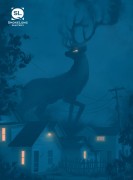In an interview, flash writer and editor Dinty W. Moore describes urgency as essential to flash fiction. Your story presents a strong undercurrent of mystery. Why is mystery important to flash fiction? How did you create this effect?
I love the idea that the “final product” (if any work of art can ever really be thought of as finished) is not the words that are published but the story that the reader and I create together in their minds.
I like to leave room for this creation in my work, especially so in my flash pieces. In my experience, the shorter the piece of prose, the more it works like poetry for the reader. For me to feel that I have played my part in the story creation process, I need to have evoked emotion or provoked thought without handing the reader an answer or lesson.
First-person and third-person point of view each has its strengths and weaknesses. In “Loneliness of the Siberian Chipmunk,” you use first person to great effect and invite the reader into a conflicted mindset while also allowing the use of an unconventional storytelling structure. Why choose first person for this story? Could this story still work in third person?
I think every plot can be told in every POV but that each POV creates a different story, even if only subtly. If I took “Loneliness of the Siberian Chipmunk” and translated it into third person, it would open up the story to possibilities first person does not allow, which could create a richer narrative; however, it would, by definition, impose distance between the narrator and the reader.
With this piece it was important to me to create that connection between the narrator and the reader. I don’t believe this story would work in third person, but a different version of this story could be very successful with a third-person narration.
Is flash fiction your first love? What personal, professional, and artistic influences do you bring into the creation of flash fiction?
My first love was dance, as far as I can remember. I started taking dance classes when I was two and have always just loved to dance, whether I’m being serious or silly. When I started writing, my first love was poetry. I wrote a lot of poems starting in elementary school that led to a long angst-ridden period I rode through junior high and high school. I didn’t even know flash fiction existed until maybe ten years ago. It was, however, the form that I was first published in—if you don’t count the junior high literary magazine.
I love beautiful sentences and intricate details, but I also highly value an economy of words. I’ve always had an impulse to communicate clearly in as few words as possible, and I think that is one of the reasons I have such an affinity for flash.
Could you tell me more about any past, present, or future projects you’re cooking up?
I have a few pieces published online, but this is the first time I am actually getting paid for my work. This is all very exciting for me! In my early twenties I received what I thought at the time were a lot of rejection slips and that led me to put poetry aside to focus on fiction. Since starting my MFA, I have been trying to judge myself less harshly and put my poetry out there more. Also, writing poetry is a great way to procrastinate when I should be working on my thesis. I’ll be graduating from George Mason University’s MFA program next spring. My thesis is a novel—or it will be—hopefully. It’s been something of an adventure trying to figure out exactly what story it is that I’m telling.



 The SmokeLong Grand Micro Contest (The Mikey) is now an annual competition celebrating and compensating the best micro fiction and nonfiction online.
The SmokeLong Grand Micro Contest (The Mikey) is now an annual competition celebrating and compensating the best micro fiction and nonfiction online.